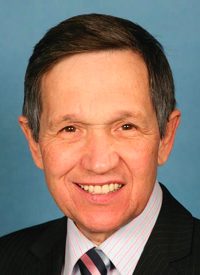
For a man who has shown little regard for the immutable and sacred principles of the Constitution during his 13-year legislative career in Congress, Representative Dennis Kucinich (D-Ohio) is inexplicably very anxious to extend constitutional protection to accused noncitizen terrorists. When questioned whether he would read Osama bin Laden his rights as required under the Supreme Court’s Miranda ruling, including the right to remain silent and the right to legal counsel, Representative Kucinich responded that everyone, without exception, should be afforded those basic rights.
During an interview on Capitol Hill, Kucinich was asked directly, “If and when the U.S. captures Osama bin Laden, should he have the right to remain silent and be given a lawyer?” Kucinich’s remarkable response, “I think that America does best when the values that we want other nations to share that we profess to stand by, and I think that every one who is accused of a crime should have the basic rights that are afforded. I mean, that’s what America is about.” This apparently situationally staunch supporter of our most sacred document continued his apology, “We abide by the Constitution, and I think that Constitution is our protection now and in the future.”
Paradoxically, if Kucinich’s fervent espousal of constitutional principles were applied consistently in his own voting behavior in Congress, then the extraordinary protections he so rightly extols might be less eviscerated than they are. Sadly for the American people, the Congressman’s proffer of constitutional safeguards is not so equitably enforced, however.
In fairness, the Representative from Ohio’s 10th Congressional District is not the only government official keen on shielding Osama bin Laden from potential violation of his civil rights. In his testimony before the Senate Judiciary Committee on November 18, Attorney General Eric Holder (the man responsible for the decision to try Khalid Sheik Mohammed in a civil court in New York) responded to a question from Senator Lindsey Graham (R-S.C.) as to whether he (Holder) believed that bin Laden should be entitled to receive the Miranda warnings, with the pallid dodge, “It all depends.”
According to a transcript of the Attorney General’s complete testimony, what the answer depends on is which agency makes the historic arrest: the CIA, the FBI, the military, etc. The Justice Department would decide on the roster of rights afforded the terrorist mastermind after deliberating over the specific facts surrounding the capture. The presumed conviction of bin Laden, the Attorney General testified, would not depend on “custodial statements” that bin Laden might make while being detained, rather it would hinge on the strength of the case built against him for his involvement in the terrorist bombings of September 11, 2001.
If tried in federal district court, then Osama bin Laden would enjoy, as does every other defendant brought before an American civil tribunal, a panoply of rights and privileges promulgated to protect him from prosecutorial abuse, as well as to provide him with every sacrosanct defense against self-incrimination and judicial over-reaching enshrined in the constitutional canon.
Photo: Rep. Dennis Kucinich



